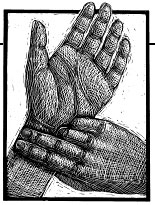Viewpoint
Eliminating errors
By Joseph R. Wilder, M.D. (website)
I wish I could say that I was as shocked as most Americans when the Institute of Medicine reported that between 44,000 and 98,000 Americans die each year because of medical errors. But in my 50 years as a doctor, I have seen too much: the wrong breast operated on, the emergency situation botched by the physician who tried to handle it over the telephone, the wrong medicine administered. And I have seen indifference, duplicity, and cover-ups shield incompetence and carelessness.
As a hospital surgical chief of staff for 20 years, I used the power of my position to insist on sound practices that gave mistakes no chance to happen. And I am convinced that if medical governing bodies did the same for all hospitals, HMOs, and clinics—laying down the strictest of policies and regulations to eliminate known unsound practices and failed treatments— the medical errors that kill, maim, and otherwise harm Americans would be largely averted.
Egregious example: To take an egregious example, consider a question that must puzzle the public. How could a surgeon possibly operate on the wrong part of the body? With the current trend toward assemblyline surgery, all too easily.
It is common practice in many institutions for a surgeon to start an operation and then leave in the middle and let an assistant finish up. The doctor may rush off to a second operating room, where another assistant has prepared another patient for surgery. All the busy surgeon sees is the operative site—a section of abdomen, for example, where a hernia is to be repaired. The rest of the patient's body is covered by a drape. Suppose the assistant, misreading a chart or working from an inaccurate record, has draped the wrong side of the abdomen? All the technical skill in the world will be for naught if the surgeon does not make an independent check before beginning to cut.
My hospital had a rule that every surgeon was required to start, carry out, and complete every case, down to placing the dressing and seeing that the patient was taken off the operating table properly.
Before the operation, every patient had his or her medical history taken and a physical performed by three different people: an intern or medical student, a resident, and the attending physician. Each doctor had to draw an outline of the body and carefully define the pertinent area—noting, for example, a lump in a lower part of the right breast. All of this information was reviewed in the operating room. As a final precaution, patients were not anesthetized until the attending surgeon had visited them and asked them to point out, themselves, the area to be operated on.
Basic rule: Most of these fail-safe practices fall under a very basic rule: trust no one. A good surgeon cannot, for example, conduct any aspect of a case on the word of an assistant alone. And reports from radiology, pathology, and the laboratory must be checked by the doctor's own inspection of the records in those departments. It is too easy for the test results from one Jones to make their way onto the record of another, leading, for example, to a doctor opening a patient to remove gallstones that do not exist.
Another basic rule is to treat (and know) the whole patient. The way is opened to mistakes when, instead of spending a half-hour taking a good medical history in the initial office visit, the doctor has a secretary hand the patient a sheet of paper to fill out, producing a record that is by its nature incomplete and vague. The doctor may then create even more room for error by skimping on the exam instead of devoting the half-hour or so that a thorough physical takes. I once had a vascular expert examine my feet with my socks on, even though it is physically impossible to feel pulses in the feet through socks; I knew, though most patients would not, that this was at best an incomplete examination, if not an incompetent one.
Too many doctors also make hurried hospital rounds, flying in and out of patients' rooms in the morning. They fail even to take a pulse, one of the most sensitive indicators of impending difficulties. They fail to make postoperative checks three times a day, or to offer the personal encouragement to patients that does so much to aid healing.
Antidote: But the fault for medical errors does not belong to surgeons alone. When was the last time a hospital board member visited patients regularly to see what life is like for them? Frequently, too, medical departments fail to firmly establish accountability in their monthly morbidity and mortality conferences. Complications and deaths should be frankly reviewed, and doctors should be asked to explain mistakes in an open conference—a powerful antidote to error.
I can speak best for my own specialty. But rules to ensure careful work, accurate record-keeping, and accountability can do just as much to stop the wrong drugs from being prescribed or given, infections from spreading rampantly through hospitals, or emergency cases from being mishandled. If some of the current political interest in medical issues can be translated into day-to-day rigor in the routine practice of medicine by hospitals and doctors, many lives can be saved.
Wilder is a 1942 graduate of Dartmouth College and an emeritus professor of surgery at Mount Sinai School of Medicine in New York. This essay was originally published in the December 10, 1999, issue of the New York Times and is reprinted here with permission.
Back to Dartmouth Medicine Summer 2000

